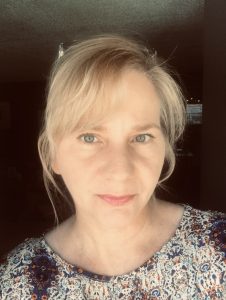When Lori Jakiela was young, the idea of being a writer wasn’t acceptable — it was like saying, “I want to be invisible,” or, “I want to be an apple.” It just didn’t happen.

“When I started thinking about doing the thing that I loved and have it be considered work, I decided to go into journalism,” said Jakiela, a memoirist, poet and the Week Eight prose writer-in-residence at the Chautauqua Writers’ Center. “It was my undergraduate major. I would go out and do interviews, and go back to the newsroom and write the story on deadline. Then, I’d pull from the experience — whatever it was — and make a poem out of it.”
Later, while working in the public relations industry, Jakiela said she met someone who told her to consider going to graduate school for poetry.
Jakiela’s response?
“‘Nobody does that, that’s insane,’” she said. “This person told me, ‘No, they’ll actually pay you to do study poetry, if you’re lucky.’ So that’s what I did; I went to the University of Pittsburgh and got my MFA from there.”
At 12:30 p.m. EDT Friday, Aug. 21, on the CHQ Assembly Virtual Porch, Jakiela will deliver a Brown Bag lecture titled, “There Is No Dust In My House: Writing About the Self and Other People,” which Jakiela said will investigate the degree to which “our lives are our own, but filled with other people’s stories.” Jakiela is the author of the memoirs Belief Is Its Own Kind of Truth, Maybe, as well as her memoir-in-progress, Say You Want To Live And Be Beautiful, which details her struggles with breast cancer.
“Flash forward a little bit further, and I was working as a flight attendant, which was totally crazy,” she said. “I was trying to write poems while I was flying, and I was living in New York, which is where you go when you want to be a writer. My poems were a mess; they weren’t working.”
Jakiela said the lines of her poems were getting longer and longer, and that she began to realize that her poems were becoming essays.
“For me, memoir and essays are a hybrid of the two things that I love, journalism and poetry together,” she said. “For me, those two things are so connected, almost like a DNA chain. Some poets would never say this, but my poems are pretty autobiographical — a lot of what I write is reportage, either reportage of observation of my life or research. The only thing I’ve really struggled to figure out is fiction.”
In fact, Jakiela said she actually set aside her novel-in-progress in order to work on Say You Want To Live And Be Beautiful.
“It’s really hard for me — and this is the journalist in me — to make things up,” she said. “I have too many choices that way.”
For her Brown Bag, Jakiela said she wants to discuss the problems and difficulties surrounding writing about people who are alive.
“There’s a responsibility for writers, especially when you’re dealing with things that are really difficult or traumatic, to try and navigate that as best as possible,” she said. “Writing about living people; writing about people that we love; writing about people who maybe we don’t love too much — it’s all important. I love the Anne Lamott quote: ‘If people wanted you to write warmly about them, they should have behaved better.’ I love that. And yet, and yet, and yet. You have to live with your heart.”




